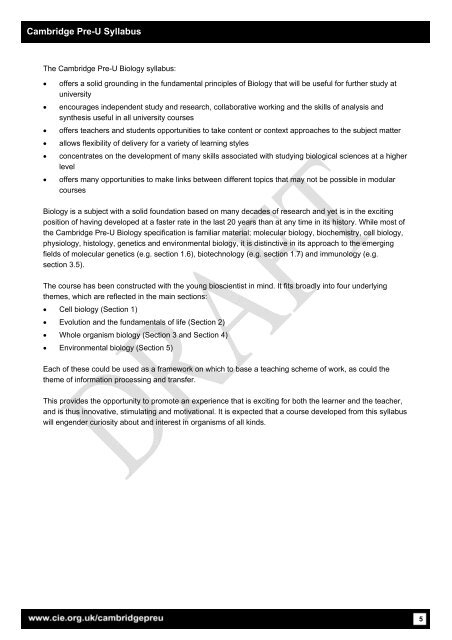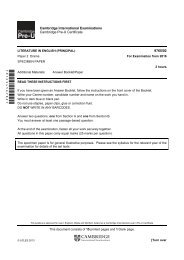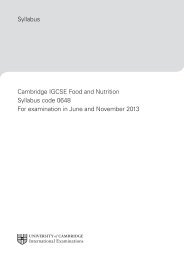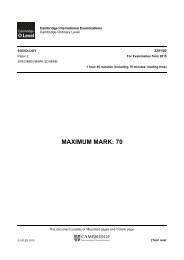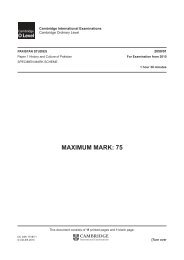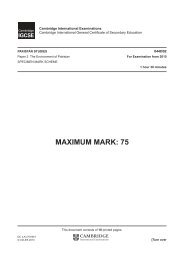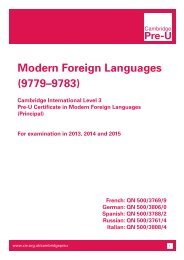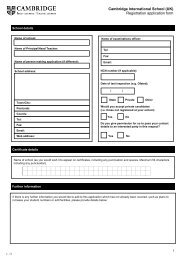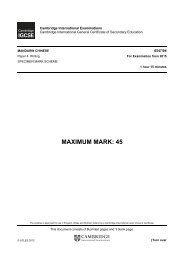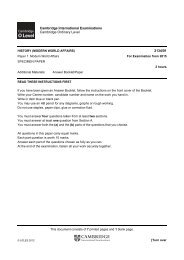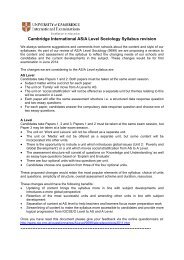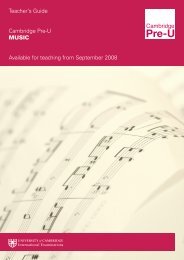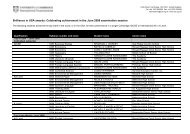Cambridge Pre-U Syllabus - Cambridge International Examinations
Cambridge Pre-U Syllabus - Cambridge International Examinations
Cambridge Pre-U Syllabus - Cambridge International Examinations
Create successful ePaper yourself
Turn your PDF publications into a flip-book with our unique Google optimized e-Paper software.
<strong>Cambridge</strong> <strong>Pre</strong>-U <strong>Syllabus</strong><br />
The <strong>Cambridge</strong> <strong>Pre</strong>-U Biology syllabus:<br />
• offers a solid grounding in the fundamental principles of Biology that will be useful for further study at<br />
university<br />
• encourages independent study and research, collaborative working and the skills of analysis and<br />
synthesis useful in all university courses<br />
• offers teachers and students opportunities to take content or context approaches to the subject matter<br />
• allows flexibility of delivery for a variety of learning styles<br />
• concentrates on the development of many skills associated with studying biological sciences at a higher<br />
level<br />
• offers many opportunities to make links between different topics that may not be possible in modular<br />
courses<br />
Biology is a subject with a solid foundation based on many decades of research and yet is in the exciting<br />
position of having developed at a faster rate in the last 20 years than at any time in its history. While most of<br />
the <strong>Cambridge</strong> <strong>Pre</strong>-U Biology specification is familiar material; molecular biology, biochemistry, cell biology,<br />
physiology, histology, genetics and environmental biology, it is distinctive in its approach to the emerging<br />
fields of molecular genetics (e.g. section 1.6), biotechnology (e.g. section 1.7) and immunology (e.g.<br />
section 3.5).<br />
The course has been constructed with the young bioscientist in mind. It fits broadly into four underlying<br />
themes, which are reflected in the main sections:<br />
• Cell biology (Section 1)<br />
• Evolution and the fundamentals of life (Section 2)<br />
• Whole organism biology (Section 3 and Section 4)<br />
• Environmental biology (Section 5)<br />
Each of these could be used as a framework on which to base a teaching scheme of work, as could the<br />
theme of information processing and transfer.<br />
This provides the opportunity to promote an experience that is exciting for both the learner and the teacher,<br />
and is thus innovative, stimulating and motivational. It is expected that a course developed from this syllabus<br />
will engender curiosity about and interest in organisms of all kinds.<br />
5


